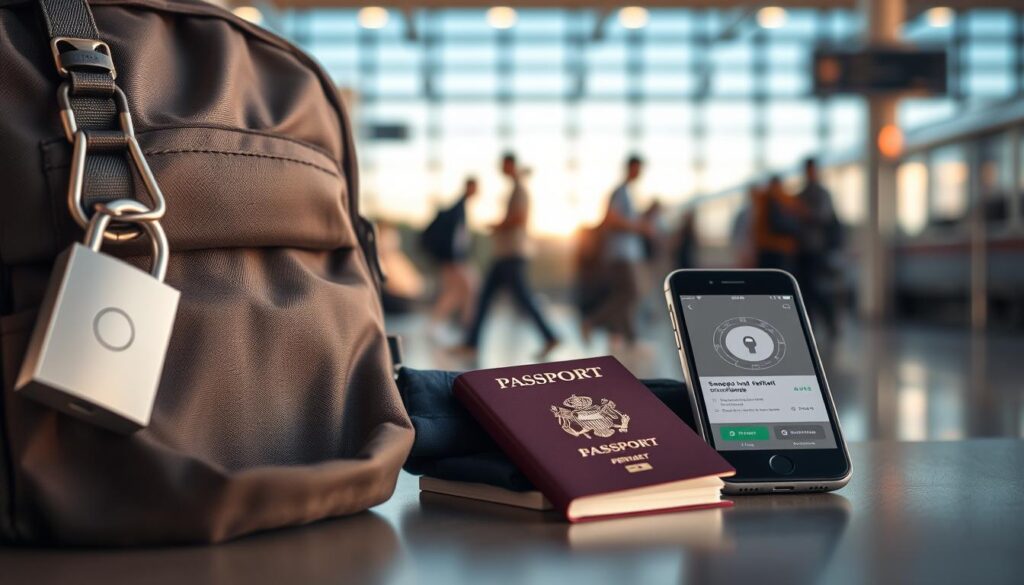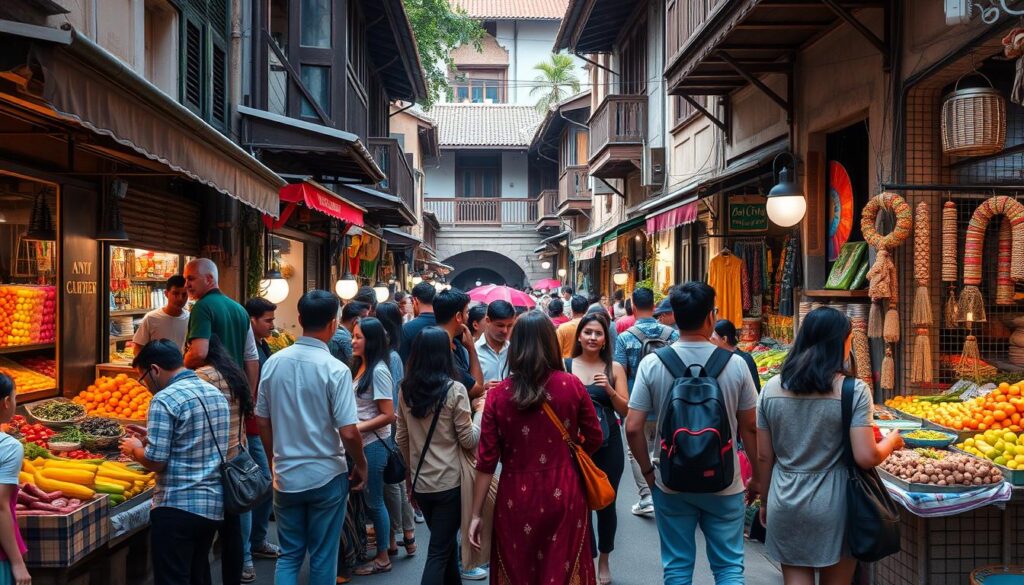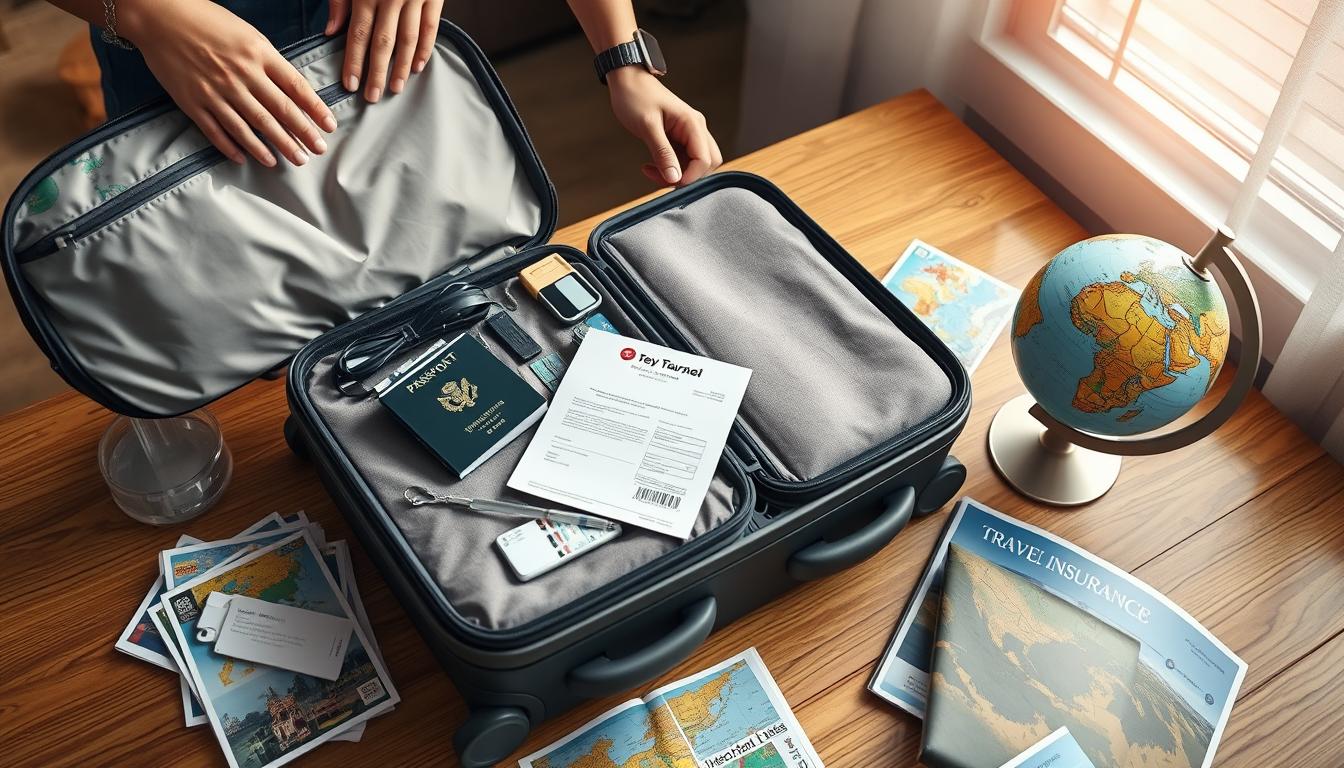Traveling is exciting and memorable, but safety comes first. Have you thought about What are the most effective precautions I can take to ensure a secure and worry-free trip? This article shares seven key tips to keep you safe while traveling. Whether you're exploring abroad or nearby, these tips will help.
Key Takeaways
- Develop a comprehensive pre-trip plan, including emergency contact information and document preparation.
- Pack wisely and utilize secure travel bags to protect your valuables while on the go.
- Prioritize hotel room safety and be mindful of your digital security while traveling.
- Familiarize yourself with local transportation options and blending in with the locals.
- Stay vigilant and trust your instincts to navigate unfamiliar environments safely.
Essential Pre-Trip Safety Planning
Before you start your next travel adventure, safety should be your top priority. Good pre-trip planning helps you feel confident and safe at your destination.
Researching Your Destination
Learning about your travel spot is key to a safe trip. Get to know the local customs, laws, and risks. Find out the safest areas and where to avoid. Also, look into any dangers or concerns you might face.
Emergency Contact Information
It's important to have a list of emergency contacts. Get the numbers for local police, fire, and medical services. Also, find the nearest embassy or consulate for help while abroad.
Travel Document Preparation
Make sure your travel documents, like passports, are current and easy to find. Have copies of these documents, both physical and digital. Tell trusted friends or family about your travel plans. This way, they can help if you need it.
Spending time on safety planning before you go makes your trip better. A bit of travel planning ensures a safe and enjoyable travel experience.
Smart Packing for Secure Travel
Packing smart is crucial for a safe trip. What you carry is very important. Stay away from shiny jewelry or valuable items that attract thieves. Choose clothes and accessories that protect you and keep your stuff safe.
A portable charger and a travel lock are essential. They help keep your devices charged and your luggage secure. Also, dressing like the locals can help you avoid being seen as a tourist. This reduces the risk of being targeted.
| Packing Tip | Benefit |
|---|---|
| Utilize packing cubes | Maximize space in your suitcase |
| Pack two sets of clothes and toiletries in your personal items | Have essentials on hand in case of emergencies or lost luggage |
| Roll clothes like a burrito | Save space and prevent wrinkles |
| Choose wrinkle-proof fabrics | Maintain a neat appearance throughout your travels |
By using these travel safety tips, you can have a safer trip. You'll be able to enjoy your journey more. Just remember, packing smart doesn't mean you can't have fun exploring.
How to Protect Your Valuables While Traveling
Keeping your valuables safe is key when you're out exploring. While violent crimes against tourists are rare, theft is still a big problem. By being proactive, you can reduce the risk and have a worry-free trip.
Choosing the Right Travel Bag
Start by picking a secure travel bag. Look for bags with slash-proof straps and locks to prevent theft. Backpacks and small bags are good for men, as they keep things close and hard to steal.
Money Security Tips
To keep your money and cards safe, follow some simple tips. Use ATMs inside banks instead of free-standing ones, which are more likely to be tampered with. Carry only what you need for the day and keep your money and cards in different places, like a money belt or hidden pockets.
Safe Storage Solutions
For things like passports and electronics, use safe storage. Use hotel safes or locked luggage to protect your items. Make digital copies of important documents for online access if they get lost or stolen. Padlocks or combination locks can also add security to your bags.
By taking these steps, you can enjoy a secure travel experience. This way, you can focus on making great memories during your vacation safety.
7 Tips for Safe Travel: Essential Safety Guidelines
Traveling can be thrilling, but safety is key. As you plan your next trip, keep these seven tips in mind:
- Research your destination thoroughly. Learn about local customs, laws, and safety concerns before you go. This helps you stay safe and confident.
- Share your itinerary with trusted contacts. Tell your loved ones about your travel plans. Include where you'll stay and any schedule changes. This ensures they can help if needed.
- Stay aware of your surroundings at all times. Always be alert. Notice who and what's around you. Trust your gut if something feels off.
- Use reputable transportation services. Choose safe and reliable ways to get around. This reduces the risk of problems.
- Protect your digital information. Keep your devices safe. Avoid public Wi-Fi and use a VPN to protect your online data.
- Blend in with locals. Dress and act like the locals. This helps you avoid unwanted attention and stay safe.
- Trust your instincts and remove yourself from uncomfortable situations. If you feel unsafe, leave the situation. Seek help from authorities or trusted sources.
Follow these seven tips to travel safely and enjoy your adventures. Your safety is the most important thing.
Staying Safe in Your Accommodation
Your hotel or accommodation is key to travel safety. Taking simple steps can make your stay secure and private. Here are some tips to keep you safe while away from home.
Hotel Room Security Measures
Always use the hotel room's locks, including the deadbolt. For extra safety, use a portable door jammer or wedge. This can stop intruders and make you feel safer.
Safe Usage of Hotel Facilities
Be careful in the hotel's common areas and facilities. Don't share your room number or talk about it in public. Keep your valuables safe and stay alert when using hotel amenities like the gym or pool.
Privacy Protection Tips
To keep your privacy, use the "Do Not Disturb" sign when you're out. Close curtains or blinds to block outside views. Be careful when letting hotel staff into your room and check their ID first.
Keeping safe in your accommodation is vital for travel safety. By following these tips, you can feel more secure and enjoy a peaceful stay, whether for work or fun.
| Statistic | Value |
|---|---|
| Percentage of Hotels with Honest Staff | Most reputable hotels with honest staff know not to give out names or room numbers, but it's still known to happen. |
| Recommended Hotel Safety Floor Levels | Safety experts recommend staying between the third and sixth floors for enhanced security. |
| Usage of Door Wedges for Security | Using a door wedge to secure the hotel room door, especially when sleeping or in the shower, to prevent potential break-ins. |
| Solo Travelers' Popularity | More and more people are traveling solo, increasing the importance of safety precautions for individual travelers. |
| Entrance Preference at Hotels | Recommendation to use the hotel's main entrance at all times for increased visibility and assistance from hotel staff if necessary. |
| Effectiveness of Visual Deterrents | Leaving the 'do not disturb' sign on the door and keeping a light and/or television on while out help create the illusion of someone being in the room to deter break-ins. |
Digital Security for Travelers
In today's world, keeping your personal info safe is key, especially when you're traveling. Whether you're seeing new places or working abroad, protecting your digital security is crucial. By being proactive, you can make sure your trip is secure and stress-free.
Public Wi-Fi networks can be risky for travelers. Cybercriminals might try to steal your data. To stay safe, use a Virtual Private Network (VPN) to encrypt your internet. This keeps your online activities private, even on public Wi-Fi.
Also, be careful what you share on social media while traveling. Posting too much about your location or plans can attract unwanted attention. Wait until you're back home to share your vacation photos and stories. This way, you keep your digital footprint safe.
Using strong, unique passwords for all accounts is also important. Enable two-factor authentication if you can. This extra security helps protect your personal info from unauthorized access.
By being careful and taking these steps, you can enjoy your travels without worrying about cyber threats. Remember, a few simple actions can greatly improve your travel safety and digital security.
"Cybersecurity is no longer just an IT issue – it's a critical component of travel safety in the digital age."

As you start your next adventure, remember these digital security tips. They help ensure your travel safety, secure travel, and traveler security. With some preparation and caution, you can confidently explore the digital world and enjoy your travels.
Transportation Safety Guidelines
Traveling safely is key, whether you're on public transit, rideshares, or walking. A few simple steps can make your journey secure and worry-free.
Public Transport Safety
Stay alert on public transport like buses or trains. Don't sleep to avoid theft and missing your stop. Keep small bags close to prevent pickpocketing. Travel during less busy times to avoid crowds.
Rideshare and Taxi Precautions
Check if the taxi driver is licensed and note their license number. For rideshares, look at the driver's ratings and reviews. Sit in the backseat, especially alone, and always wear a seatbelt.
Walking Safety Tips
Be aware of your surroundings when walking. Don't show off valuable items or lots of cash. Stick to bright areas and walk with a friend if you can. Trust your gut if something feels off.
Blending In Like a Local
Traveling to a new place can be thrilling and tough at the same time. One important way to stay safe is to blend in like a local. This means you won't stand out as a tourist, which can help avoid theft or other crimes. Here are some tips to help you fit in with the local culture and community.
First, dress like a local. Don't wear clothes that scream "I'm a tourist." Go for simple, neutral colors and styles that match the local fashion. In some places, wearing certain clothes, like t-shirts and jeans, might be seen as rude, even in warm weather. Learn what's considered proper and dress right.
Be careful with maps and guidebooks. Using them in public can make you look like a visitor. Instead, try to remember the area or use a digital map on your phone. Also, learning a few basic phrases in the local language can help you blend in and talk to people more easily.
- Watch how locals act to understand the culture better.
- Try not to draw attention to yourself by moving purposefully and not looking lost.
- Think about staying in a homestay or apartment to really get to know the community.
- Join in on local events and activities to connect with the community and feel more at home.
By blending in, you can make your trip better and lower your chances of being targeted by criminals. The key is to be aware of your surroundings, adapt to the local way of life, and try to fit in seamlessly.
| Blending In Strategies | Potential Benefits |
|---|---|
| Dressing like a local | Reduced risk of being targeted as a tourist |
| Discreet use of maps and guides | Avoidance of drawing unwanted attention |
| Learning basic local language phrases | Improved ability to interact with locals |
| Observing and adapting to local customs | Enhanced cultural immersion and respect |
| Participating in local events and activities | Deeper connection with the community |
Using these strategies can make your travel safer and more enjoyable. Blending in like a local is not just smart; it's also a great way to really experience the place you're visiting.

How to Handle Emergency Situations Abroad
Planning a dream vacation doesn't mean ignoring emergencies. Being ready for unexpected situations can make a big difference. Knowing how to handle medical emergencies, lost documents, and embassy help can give you peace of mind.
Medical Emergency Procedures
If you face a medical emergency abroad, find the nearest hospital or clinic first. Research this before you go and keep it handy. Also, know the local emergency number, as it might not be 911.
Travel insurance is key for medical emergencies. It covers treatment costs and even emergency flights. Atlas Travel offers coverage for illnesses and injuries, so you can get care without worrying about money.
Lost Document Protocol
Lost travel documents are stressful, but knowing what to do helps. If your passport is gone, contact the nearest U.S. embassy or consulate right away. They'll help you get a new one.
Make copies of important documents and keep them safe. This makes replacing them easier if you need to.
Embassy Assistance Guidelines
The U.S. Department of State has travel advisories to help you understand risks. Always check these before you travel.
Also, know what your embassy or consulate can do for you. They help with medical emergencies, legal problems, and lost documents. Keep their contact info handy.
Preparation is key for a worry-free trip. By being ready for emergencies, you can enjoy your travels more. You'll know you're prepared for any travel safety, travel risks, or traveler security issues.
Conclusion
Following these 7 tips for safe travel can greatly reduce risks. You'll enjoy a more secure travel experience. Remember, staying alert, trusting your gut, and being ready are crucial for safe travels.
No trip is completely risk-free, but these tips will help you face challenges. They'll also help you make the most of your adventures.
From planning before you go to keeping your valuables safe, each step in this article boosts your travel security. By focusing on safety, you can enjoy the excitement of your trips without worry.
The main goal is to let you explore the world with confidence. You can enjoy new experiences while staying aware of your surroundings. With the right approach and precautions, your travels will be unforgettable and enrich your life.

